President
Turkey cuts interest rate to 42.5% after inflation hits two-year low
Turkey’s central bank lowered its key interest rate by 2.5 percentage points on Thursday, its third consecutive cut, reacting to a slowdown in inflation in the country.
Turkey lowered its benchmark one-week repo rate from 45% to 42.5% on Thursday.
The decision came after official data showed annual inflation dipping below 40% for the first time in nearly two years.
In a statement released after the committee meeting, the bank said it would review inflation trends and adjust rates cautiously in upcoming policy meetings.
“While inflation expectations and pricing behaviour tend to improve, they continue to pose risks to the disinflation process,” the bank said.
“Monetary policy tools will be used effectively in case a significant and persistent deterioration in inflation is foreseen.”
Annual inflation in Turkey slowed to 39.1% in February from 42.1% in the previous month, according to the Turkish Statistical Institute.
However, a group of independent economists have raised concerns about the official inflation figures and estimate the rate to be significantly higher.
High inflation in Turkey has been attributed to a combination of factors, including rising energy prices and the economic fallout from the COVID-19 pandemic.
Analysts also blame the past economic policies of President Recep Tayyip Erdogan – who unconventionally decided to lower interest rates in the face of soaring inflation.
Erdogan has long argued that high interest rates cause inflation, a theory that runs contrary to mainstream economic theory.
In 2023, President Erdogan appointed a new economic team, signalling a shift away from his unorthodox policies.
The team initially implemented a series of interest rate hikes to combat inflation.
After maintaining the interest rate at 50% for several months, the bank has embarked on a gradual cycle of rate cuts.
President
Turkey to fully enforce stray dog cull law, interior minister says
Ankara has pledged to fully apply a law to remove millions of stray dogs from the streets after the death of a toddler. However, opponents believe this could lead to further widespread neglect of pets.
Turkey’s interior minister has pledged to fully apply a law to remove millions of stray dogs from the streets in the wake of the death of a toddler earlier this week.
“Either they will do this job or I will use whatever authority the law gives me to the fullest,” Interior Minister Ali Yerlikaya said in a video message posted on social media.
The two-year-old Rana El Selci died after being attacked by a pack of stray dogs in the central Turkish city of Konya on Friday, sparking fresh outcry about the 4 million stray dogs that the government estimates roam Turkey’s streets and rural areas.
A criminal investigation was launched following her death as municipal workers began rounding up dogs in the city. On Saturday, President Recep Tayyip Erdogan said that the government was “taking determined steps to ensure the implementation of the law.”
The legislation – labelled the “massacre law” by animal welfare groups – was passed by parliament last summer but has been only partially implemented by municipal authorities.
It requires municipalities to collect stray dogs and house them in shelters to be vaccinated, neutered or spayed before making them available for adoption. Dogs that are in pain, terminally ill, or pose a health risk to humans will be euthanised.
A report released by the Safe Streets and Defence of the Right to Life Association, an organisation campaigning for the removal of all stray dogs from the streets, says that 65 people have died in street dog attacks since 2022, not including Rana El Selci.
Animal lovers fear the legislation will lead to dogs being killed or ending up in neglected, overcrowded shelters. When the law was passed, the main opposition party pledged that its municipalities would not implement the round-up of strays.
Admiration for ‘man’s best friend’
The issue has proven to be divisive in Turkish society, with at least one former government minister having professed his admiration for “man’s best friend”.
During the COVID-19 pandemic five years ago, the former Minister of Justice Adbulhamit Gul posted a photo of himself on X petting a dog, saying: ”We should not abandon our animal friends during these tough days.”
The post came as the government was publicly promoting feeding stray animals whilst COVID-19 restrictions were in force.
Meanwhile, demonstrations in cities across Turkey have seen thousands call for the law to be scrapped. There have also been protests across Europe, as people warned the legislation could dissuade tourists from visiting Turkey.
Some critics have blamed the growth in the stray canine population on the failure to implement previous regulations, which required stray dogs to be caught, neutered, or spayed and returned to their original location.
Turkey’s Animal Rights Federation, HAYTAP, posted a video on X showing stray dogs and cats peacefully coexisting with people in the street, in shops, and even on the metro network.
The organisation recalled a previous attempt to get rid of stray dogs in 1910 in a statement on its website: “In an effort to ‘Westernise’ Istanbul just before the fall of the Ottoman Empire, the Sultan ordered tens of thousands stray dogs from Istanbul to be sent to a nearby island.”
“The island did not have food or water for the dogs, so this ended horribly with cannibalisation, starvation, and many dogs drowning trying to swim back. Records show reports of people on the mainland being haunted by hearing the howls of the starving dogs on the island,” HAYTAP said.
Animal rights activists are concerned that some municipalities might kill dogs on the pretext that they are ill rather than allocate resources to shelter them.
Videos showing dead cats and dogs buried in ditches have been circulating on social media. Animal rights activists say the animals were indiscriminately killed after the passage of the law.
President
Polish prime minister urges Turkey to play key role in Ukrainian peace process
The leaders of Turkey and Poland met in Ankara to discuss strengthening ties during Warsaw’s presidency of the European Council and regional issues, including Russia’s ongoing war in Ukraine.
Polish Prime Minister Donald Tusk on Wednesday proposed that Turkey take an active role in initiating peace talks between Russia and Ukraine.
At a joint press conference with Turkish President Recep Tayyip Erdoğan in Ankara, Tusk said both Turkey and Poland have wanted peace since Russia launched its full-scale invasion of Ukraine in 2022.
Tusk added that Warsaw welcomed talks held in Saudi Arabia this week – in which Ukraine agreed to a US-proposed immediate one-month ceasefire pending Moscow’s acceptance.
“Our goal is to stabilise the region. We need to rebuild Ukraine,” he said. “This is an opportunity for both Polish and Turkish companies.”
Following a meeting between the two leaders in which they discussed bilateral and global issues, Erdoğan told reporters that Turkey and Poland are key allies positioned on the eastern and southern flanks of NATO.
The two countries command the alliance’s two largest ground armies in Europe.
Erdoğan also emphasised that Turkey’s membership in the EU is a strategic goal.
“If the European Union wants to prevent and even reverse its loss of power and altitude, it can only do so with Turkey’s full membership,” he said.
President
Syria’s interim president meets Erdoğan to discuss joint strategy to confront security threats
Turkey, who shares a 910 kilometre border with Syria, is considered a key ally of its new administration.
Turkish President Recep Tayyip Erdoğan welcomed Syria’s interim president, Ahmad al-Sharaa at the presidential palace in Ankara in Turkey on Tuesday to discuss Syria’s economic recovery and its security and stability.
At a joint press conference following the meeting at the presidential palace, Al-Sharaa said Turkey and Syria were planning a “joint strategy” to tackle security threats to both countries.
“We discussed the threats that would prevent the unity of Syrian lands in northeastern Syria,” the former rebel leader said.
One of the threats to Turkey are the presence of Kurdish-led forces in the north of Syria.
Turkey views the Syrian Kurdish militias, who are part of the US-allied, Kurdish-led Syrian Democratic Forces (SDF) as an extension of the banned Kurdistan Workers’ Party. They are pressing for the group to disband, and Turkish-backed fighters are battling the SDF in an attempt to push the Kurdish militias away from the Turkish border.
“We also discussed the need for international pressure on Israel to withdraw from the buffer zone in southern Syria and implement the 1974 agreement,” he added.
Al-Sharaa was appointedas interim president last week. He was the former leader of the Hayat Tahrir al-Sham (HTS) organisation, who lead the insurgents who toppled President Bashar Al-Assad in December.
It marked his second international trip, following his recent visit to Saudi Arabia earlier this month.
Al-Sharaa was welcomed by the Erdoğan and a small group of the honour guards at the entrance of the presidential palace. It was a low-key ceremony compared to visits by other heads of state, who are usually received with military bands and troops escorting them.
Turkey was a strong backer of groups opposing al-Assad during the 13-year civil war, and are therefore considered a key ally to the new administration.
Turkey, who shares a 910 km border with Syria, has also hosted the greatest number of Syrian refugees following the outbreak of the war in 2011, welcoming more than 3.8 million people at its peak in 2022.
-
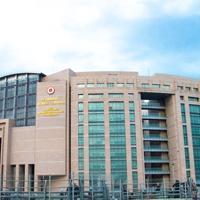
 Daily Agenda2 months ago
Daily Agenda2 months ago5 suspects nabbed for sharing information with Iranian intel
-
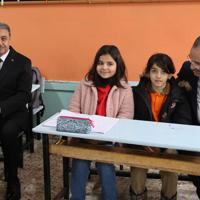
 Politics1 month ago
Politics1 month agoSoutheastern city enforces fines to tackle student absenteeism
-
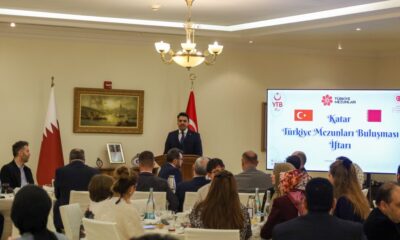
 Lifestyle2 months ago
Lifestyle2 months agoTürkiye’s Embassy in Doha hosts iftar for alumni to foster connections
-

 Refugees2 months ago
Refugees2 months agoInternational Women’s Day: global protests demand equal rights
-

 Sports2 months ago
Sports2 months agoPaulista 19 maç sonra geri döndü, maç sonrası isyan etti
-

 Daily Agenda2 months ago
Daily Agenda2 months agoTrump hangi ülkelere yasak getirdi.
-
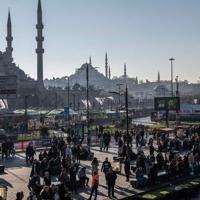
 Politics2 months ago
Politics2 months agoIstanbul ‘may break 110-year temperature record for March’
-
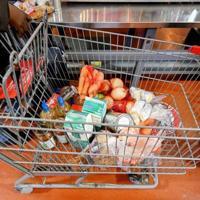
 Economy2 months ago
Economy2 months agoSweden to hold talks on countering soaring food costs

